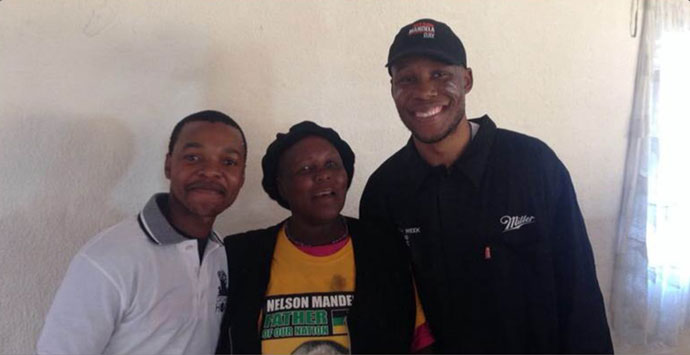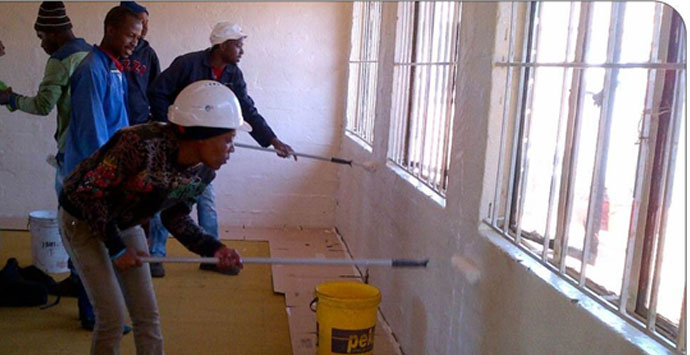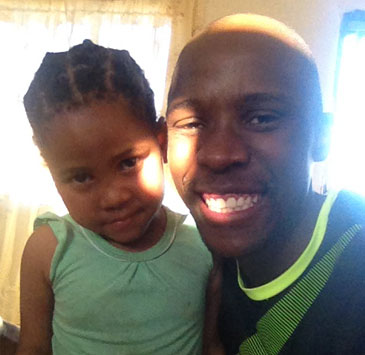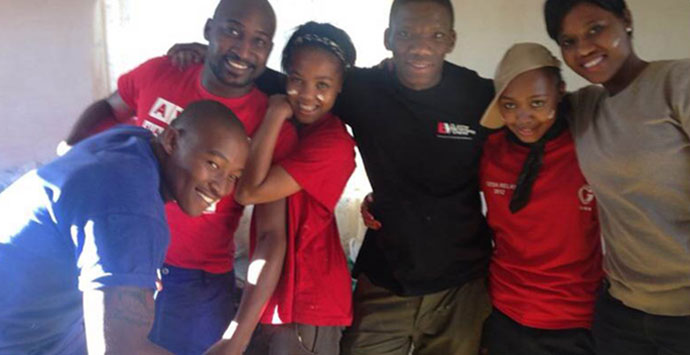AECOM employee revamps orphanage in South Africa in honor of Nelson Mandela International Day
In honor of the United Nations’ Nelson Mandela International Day on July 18, AECOM’s Ivan Lukhele shares his experiences helping to fight poverty in South Africa. AECOM awarded Lukhele the “Best Corporate Social Responsibility Project Award for Nelson Mandela Day” at last year’s Africa Achievement Awards celebration.
It was a Sunday evening when I went to the local filling station to fill up my car for the week ahead. Just after the petrol attendant finished enquiring about the amount of petrol I wanted, there was a sudden knock on my car window. It turned out to be a young fellow, which caught me off guard because it was late in the evening, after 9 p.m. I wound down the window to listen to what he had to say; he politely asked for money to buy bread.
I paused for a second and decided not to give him the money, but instead, I decided to go buy the bread for him myself. As it was a Sunday evening, and I knew he needed to go to school the following day, I also offered to take him home to Orange Farm. We drove approximately 1.5 kilometres from the filling station, and as we pulled up to the entrance of his home, he quickly advised me that it was not actually a house. Instead, it was the Kopanong Dropping Centre, an orphanage home where he lives with 16 other people. He said that there was no food at the orphanage the entire week, which is why he was at the filling station asking for money.
I later discovered that the orphanage home was founded by Julia Tshabalala, who is assisted by Mabela Hlabisa and Cecilia Mazomba. After Tshabalalas’ daughter passed away in 2002, Tshabalala had to take care of the seven grandchildren her daughter left behind.
 Julia Tshabalala (center), founder of the orphanage home along with the founders of Black Orange Kairos, Tshepo Lesiba (left) and Bafana Nhlapo (right).
Julia Tshabalala (center), founder of the orphanage home along with the founders of Black Orange Kairos, Tshepo Lesiba (left) and Bafana Nhlapo (right).
While she was supporting and raising her grandchildren, word quickly spread that she was taking in orphans, and orphaned children from the area began flocking to Tshabalalas’ house to seek food and shelter. She then decided to convert her house into an orphanage home.
The orphanage is now supported by a government social grant as well as donations that Tshabalala receives from local churches and members of the community. Because funding is inconsistent, the orphanage sometimes runs out of food. After learning more about the situation, I was driven to assist in any way that I could.
Two months later, approximately 40 of my friends and colleagues, as well as Eyethu Football club’s under-19 division, assisted in executing the works for the day. This included cleaning up the property by fixing the perimeter fence surrounding the home; painting the kitchen, female and male dormitories, and the caretaker’s house; and replacing all of the damaged windows on the property.
 A group of volunteers paint the main dormitory at the orphanage home.
A group of volunteers paint the main dormitory at the orphanage home.
Since that day, we have been able to provide donations totalling more than 56,000 rand (US$4,500), which includes vegetables; canned food; blankets; clothes such as brand new Nike footwear for each of the kids and the caretakers at the centre (as seen in the main image); 35 pieces of furniture (e.g., study desks and books); and toiletries. Sponsors and volunteers include AECOM employees; non-profit organization Black Orange Kairos; Gail Johnson, founder of non-governmental organization (NGO) Nkosis Haven; Carol Dyantyi, founder of the Ikageng itereleng AIDS ministry (NGO); Eplazini Brand Communications; and other individuals. To this day, we still receive donations for the orphanage home from individuals within the community and my colleagues at AECOM.
 Ivan poses for a photo with a young girl from the orphanage home during his volunteer work.
Ivan poses for a photo with a young girl from the orphanage home during his volunteer work.
To ensure that the orphanage home is self-sustaining, we also approached Norton Rose Fulbright, a global legal practice firm based in Sandton, Johannesburg, South Africa, to assist in establishing a trust for the benefit of the orphanage home. Norton Rose Fulbright was more than happy to assist pro bono, and thus far, we have already drafted a trust deed for the orphanage home that will be finalized in the next month.
For this upcoming International Mandela Day, we are targeting areas with high levels of poverty to improve children’s chances for educational success. Local research suggests that school uniforms, and more specifically, school shoes, are amongst the leading reasons for high dropout rates in schools in the rural areas of South Africa. With many students walking at least two hours per day to school, we plan to donate stationery and nearly 200 school uniforms to children in eMondlo, a rural area in the Kwa-Zulu Natal province in South Africa, to help combat this problem.
 A group of volunteers from Black Orange Kairos who dedicated their time to the completion of this project. From left to right: Boitumelo Mmuoe, Buhle Tshwentshwe, Thandeka Nkosi, Leeto Moses Khoza, Tebogo Motloung and Sweetness Gugulethu Radebe.
A group of volunteers from Black Orange Kairos who dedicated their time to the completion of this project. From left to right: Boitumelo Mmuoe, Buhle Tshwentshwe, Thandeka Nkosi, Leeto Moses Khoza, Tebogo Motloung and Sweetness Gugulethu Radebe.
With these and future initiatives, we hope to reinforce the statement that our former state president, Mr. Nelson Rolihlahla Mandela, made: “Young people must take it upon themselves to ensure that they receive the highest education possible so that they can represent us well in the future as future leaders.”
 Ivan Lukhele is a candidate quantity surveyor at AECOM in South Africa in the buildings and places division based in Sandton, Johannesburg. He is a vibrant and ambitious young person, a philanthropist at heart, and a lover of life and all of the challenges it brings.
Ivan Lukhele is a candidate quantity surveyor at AECOM in South Africa in the buildings and places division based in Sandton, Johannesburg. He is a vibrant and ambitious young person, a philanthropist at heart, and a lover of life and all of the challenges it brings.
LinkedIn: Ivan Lukhele
Twitter: @lukhelei






